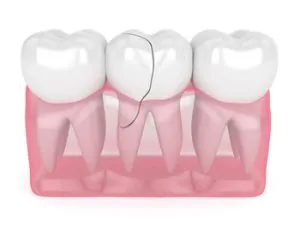There are various dental treatment options for repairing a damaged or missing tooth. Two of the most common are dental implants and dental crowns. Both can effectively address a damaged or decayed tooth, but they serve distinct purposes and are ideal for different situations. So, what sets them apart? And more importantly, which option is right for you when dealing with tooth loss or damage?
Let’s dive deeper into comparing dental implants and crowns and explore the advantages of opting for a dental implant treatment over a crown.
Understanding Dental Crowns and Dental Implants
Before diving into the pros and cons of each option, it’s important to understand their key differences and how they function in treating dental issues.
What Are Dental Crowns?

Crowns are also used in conjunction with other treatments, such as dental bridges and veneers, and they are a highly effective way to restore damaged teeth.
What Are Dental Implants?
A dental implant is a more advanced and comprehensive option for replacing a missing tooth or badly decayed teeth that can no longer be saved. Unlike a crown, a dental implant replaces the entire tooth, including the tooth’s root. This is achieved by surgically fixing a titanium post into the jaw bone, which serves as an artificial tooth root. Once the implant is in place and the healing process is complete, a prosthetic tooth (a crown) is placed on top of it, giving the appearance and function of a natural tooth.
This dental restoration treatment is ideal for replacing missing teeth or restoring a damaged or missing tooth when the root is no longer salvageable.
Dental Implants vs Crowns: Which Option Should You Choose?
Now that we know what dental crowns and implants are, let’s examine the debate on dental implants vs. crowns by comparing the benefits of each treatment option and explaining why dental implants provide a more robust solution for tooth replacement in many cases.
Long-Term Durability and Strength
A major distinction between dental implants and crowns lies in their durability and longevity, with each offering varying degrees of long-term effectiveness.
- Dental Crowns: While a dental crown can last for many years, its lifespan largely depends on the health of the existing tooth beneath it. If the remaining tooth structure is compromised due to decay or further damage, the crown may need to be replaced. Crowns are vulnerable to wear and tear over time, especially if placed on a tooth that has undergone significant damage.
- Dental Implants: Dental implants are a permanent solution. The titanium post that is implanted into the jaw bone acts as a stable and sturdy replacement for the tooth’s root, ensuring the artificial tooth remains securely in place. The durability of implants means they can last a lifetime with proper care, providing a reliable and long-term solution for tooth loss.
Natural Appearance and Functionality
Both crowns and implants are designed to look and function like natural teeth, but there are subtle differences in how they achieve this.
- Dental Crowns: Crowns offer an aesthetically pleasing option for restoring a damaged or misshapen tooth. They are tailored to match the colour and shape of your natural teeth, allowing them to blend in effortlessly and making them virtually indistinguishable from the rest of your smile.
- Dental Implants: Implants provide an even more natural appearance and function because they replace the entire tooth, including the root. This allows them to mimic the feel and function of a natural tooth far better than a crown alone. The stability provided by the titanium root ensures that the replacement tooth behaves just like a real tooth when eating, speaking, and smiling.
Preserving Jaw Bone and Oral Health
The health of your jawbone plays a critical role in maintaining overall oral health. Dental implants’ key advantage over crowns is their ability to prevent bone loss and further damage to the surrounding teeth.
- Dental Crowns: Since a crown is placed over an existing tooth, it does not address any potential bone loss that may occur as a result of tooth damage. In fact, crowns rely on the remaining tooth structure, meaning the underlying oral health issues are not always resolved.
- Dental Implants: Dental implants actively preserve the health of your jaw bone by stimulating bone growth, preventing the bone from deteriorating after a tooth is lost. The artificial tooth root merges with the bone, ensuring the surrounding bone remains strong and intact, which is essential for long-term oral health.
Treatment for Missing Teeth
If you’re dealing with missing teeth, the treatment option you decide on will largely depend on whether you need to address the loss of one or more teeth.
- Dental Crowns: Crowns are not a direct solution for missing teeth but can be used with other treatments, such as dental bridges or implants, to restore a missing tooth.
- Dental Implants: Implants vs crowns is a straightforward decision when you have missing teeth. Dental implants are the prime choice for replacing missing teeth, as they address the entire structure of the missing tooth—from root to crown. Whether you’re replacing a single or multiple teeth, dental implants provide a comprehensive and effective solution.
Comfort and Stability
Dental implants hold a significant advantage over crowns in terms of comfort and stability.
- Dental Crowns: While crowns are custom-fitted to the existing tooth, they can sometimes feel bulky or uncomfortable if the remaining tooth structure is not robust enough. Over time, crowns can also shift or become loose, requiring adjustments or replacements.
- Dental Implants: Because dental implants integrate with the jaw bone and act as a permanent solution, they offer unparalleled comfort and stability. After the healing period is finished, the implant functions and feels the same as a natural tooth, offering a smooth and comfortable experience while eating, speaking, or smiling.
Maintenance and Care
Both dental implants and crowns require regular dental care, but implants tend to be lower maintenance in the long run.
- Dental Crowns: Crowns require the same level of care as your natural teeth, including routine brushing and flossing. However, the existing tooth underneath the crown is still prone to decay, and the crown itself may need to be replaced if it becomes damaged.
- Dental Implants: Implants provide a virtually maintenance-free solution. While you still need to maintain good oral hygiene, implants do not decay like natural teeth. This makes them a more durable and low-maintenance option for tooth restoration.
Exploring the Healing Process: Dental Implants vs Crowns
Understanding the healing process for both treatments can help you set realistic expectations when considering your dental options.
Healing Process for Dental Crowns
- Crown Placement: Once your dentist prepares your damaged tooth for the crown by reshaping it, the dental crown procedure typically takes only one or two appointments. After the placement of the permanent crown, there’s no need for extended recovery time, and you can immediately resume your daily activities.
- Post-Procedure Care: You might experience some mild discomfort or sensitivity around the crown placement site, but this subsides quickly. Crowns are designed to offer immediate functionality, allowing you to chew and speak as you would with your natural teeth.
Healing Period for Dental Implants
- Surgical Procedure: Unlike crowns, getting a dental implant requires more involvement. The dental implant procedure includes a surgical phase, where the titanium post is inserted into the jaw bone. Following this, the healing period begins, which is essential for the success of the implant. During this time, the implant fuses with the bone in a process called osseointegration.
- Recovery Time: The healing period for dental implants can take several months, depending on how quickly your body responds. However, once fully healed, the result is a permanent solution that’s both durable and secure. You’ll need to follow your dentist’s advice on post-surgery care, which may include a temporary diet of soft foods to ensure that the implant heals without interference.
- Bone Grafting: For some patients, there might not be enough bone material in the jaw to support the implant. In these situations, a bone graft might be required, which extends the total healing time. However, this ensures the dental implant replaces the missing tooth securely and remains stable for years to come.
Longevity and Reliability: Which Lasts Longer?
Another critical consideration when deciding between crowns and implants is longevity. Both treatments offer durable solutions, but dental implants tend to outshine crowns in terms of overall lifespan and long-term effectiveness.
Lifespan of Dental Crowns
- Average Lifespan: A dental crown can last between 10 and 15 years with proper care. However, this depends heavily on factors such as the health of the underlying tooth, the materials used, and how properly the patient maintains oral hygiene.
- Wear and Tear: Over time, crowns are subject to wear and tear, particularly in patients who grind their teeth or suffer from jaw clenching. Though durable, crowns can eventually chip or crack, especially if they are made from materials like porcelain or ceramic. When this occurs, the crown will need to be replaced.
Longevity of Dental Implants
- Implants Provide a Lifetime Solution: One of the key advantages of dental implants is that, with proper care, they are made to endure a lifetime. The titanium post that is surgically fixed into your jawbone is incredibly strong and resistant to decay or damage. The prosthetic tooth attached to the implant may need to be replaced over time, but the implant remains secure and stable for life.
- Bone Health: Since implants stimulate the jaw bone like a natural tooth, they prevent the bone from deteriorating. This helps maintain facial structure and contributes to the implant’s long-term success, ensuring your dental restoration remains functional and aesthetically pleasing.
Impact on Surrounding Teeth: How Each Option Affects Your Smile
Another important consideration when deciding between dental implants and crowns is how each option impacts your surrounding teeth and overall smile.
Crowns and Surrounding Teeth
- Supporting Structures: In cases where a crown is used to restore a broken tooth or decayed tooth, the health of the surrounding teeth is usually not affected, provided they are healthy. However, crowns are often placed on teeth that have been significantly weakened by decay or trauma, so they might not offer the same structural support that a natural tooth would.
- Dental Bridges: When crowns are employed as part of a dental bridge to fill the gap of a missing tooth, the surrounding teeth must be reshaped to serve as anchor points for the bridge. This can affect the integrity of these healthy teeth as they undergo some degree of alteration to support the replacement tooth.
Implants and Surrounding Teeth
- No Impact on Healthy Teeth: One of the x is that they do not rely on existing teeth for support. Instead, the artificial tooth root is placed directly into the jaw, leaving the surrounding healthy teeth untouched. This makes implants a better choice for patients who want to preserve their natural teeth without compromising their structure.
- Preserving Tooth Structure: By replacing the entire tooth—from root to crown—dental implants maintain your smile’s integrity without altering or damaging adjacent teeth. This makes them an ideal solution for patients who value the long-term preservation of their tooth structure.
Cost Considerations: Crowns vs Dental Implants
Cost is a major factor in deciding between crowns and implants, as each treatment has different financial implications.
Cost of Dental Crowns
- Affordable Option: Crowns tend to be the more affordable choice in the short term, especially if the patient’s existing tooth is in good condition and only requires minor restoration. The price for a dental crown can vary based on the material used (porcelain, zirconia, metal, etc.) and the complexity of the procedure. Still, it is typically less expensive than a full dental implant procedure.
Cost of Dental Implants
- Higher Initial Cost: Dental implants are usually more expensive than crowns due to the surgical component and the advanced materials involved. However, when you factor in dental implants’ long-term benefits and durability, they can be a more cost-effective solution over time. Implants do not require the same level of maintenance or replacement as crowns, making them a worthy investment for those seeking a permanent solution to tooth loss.
Who is a Candidate for Dental Implants?
Not everyone qualifies as an ideal candidate for dental implants, as the procedure depends on several factors, including the patient’s bone density and overall health.
- Enough Bone Material: To support an implant, a patient must have enough bone in their jaw to anchor the titanium post. A bone graft may be required to guarantee the implant remains stable if there is insufficient bone due to previous bone loss.
- Oral Health: Patients with severe gum disease, uncontrolled diabetes, or other health issues may not be suitable for implants without first addressing these conditions. A dental crown or other non-surgical tooth restoration might be a more appropriate option for these patients.
Conclusion: Dental Implants Provide the Superior Solution

If you’re facing tooth loss or extensive damage, dental implants provide the best chance for a permanent solution that matches the look, feel, and function of your natural teeth. For more information about dental implants, reach out to contact Good Choice Dental at (02) 8203 8760.
Note: Any surgical or invasive procedure carries risks. Before proceeding, you should seek a second opinion from an appropriately qualified health practitioner.
References:
Foundation for Oral Rehabilitation. (n.d.). Oral hygiene instructions. https://www.for.org/en/treat/treatment-guidelines/edentulous/aftercare/prosthetic-aftercare/oral-hygiene-instructions
Nickerson, C. (2023, August 22). How much do dental implants cost? Forbes Health. https://www.forbes.com/health/dental/how-much-dental-implants-cost/
WebMD. (n.d.). Dental crowns: What are they, types, procedures & care. https://www.webmd.com/oral-health/dental-crowns
Cleveland Clinic. (n.d.). Dental implants. https://my.clevelandclinic.org/health/treatments/10903-dental-implants
Healthline. (n.d.). Bone graft: Purpose, procedure, and risks. https://www.healthline.com/health/bone-graft






Recent Comments